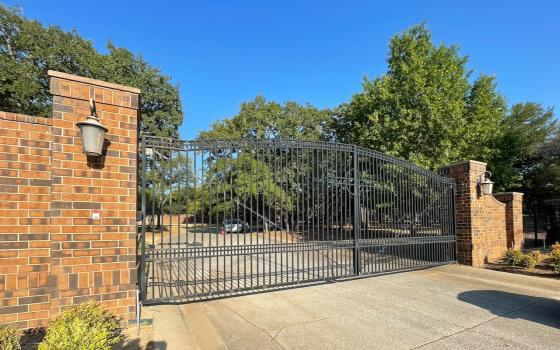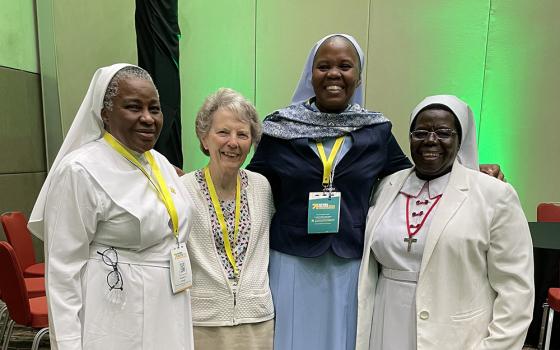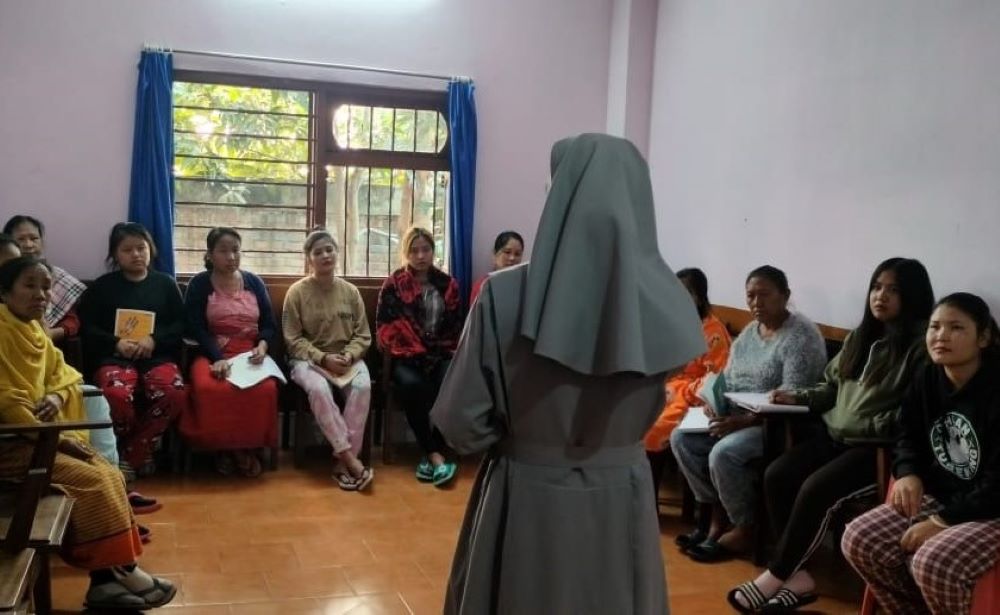
Salesian Sr. Roni Elizabeth leads a psycho-education session at the Sneha Bhavan Integrated Rehabilitation Centre in Imphal, Manipur, India. (Courtesy of Roni Elizabeth)
Friends and relatives of Shantirani are at the forefront of a civil war in the northeastern Indian state of Manipur, but the 28-year-old is fighting her own war against drug addiction.
Helping Shantirani (not her real name) and about 25 other women are Salesian Sisters of Don Bosco who operate a residential rehabilitation center in the state capital of Imphal.
"Women in Manipur are courageous, educated and enterprising, but they are also severely affected by drug use disorder," said Salesian Sr. Roni Elizabeth, who directs Sneha Bhavan Integrated Rehabilitation Centre for Addicts, which exclusively serves women.
Many women are caught up in the ethnic clashes that began May 3, the nun in her early 30s told Global Sisters Report.
The nuns' center houses women from both the Meitei and Kuki communities who are involved in the violence. The majority of Meitei people are Hindus, while the Kuki tribe is predominantly Christian.
Elizabeth, a nun from the Naga tribe, a community not involved in the clashes, said the ongoing conflict has forced the center to send Kuki women needing treatment for addiction to relief camps outside the state capital.
The Salesians, who celebrate 100 years of their mission in northeastern India this year, started the Sneha Bhavan center in 1994 after substance abuse became a major social problem in the region, especially in Manipur, Elizabeth said.
Although a tribal solidarity rally triggered the most recent violence in the region, the Manipur government has described a war against drugs since at least 2017. Officials accuse tribal communities living in the state's hill regions, especially Kukis, of cultivating poppy plants and cannabis and suggest destruction of opium poppy played a role in the recent clashes.
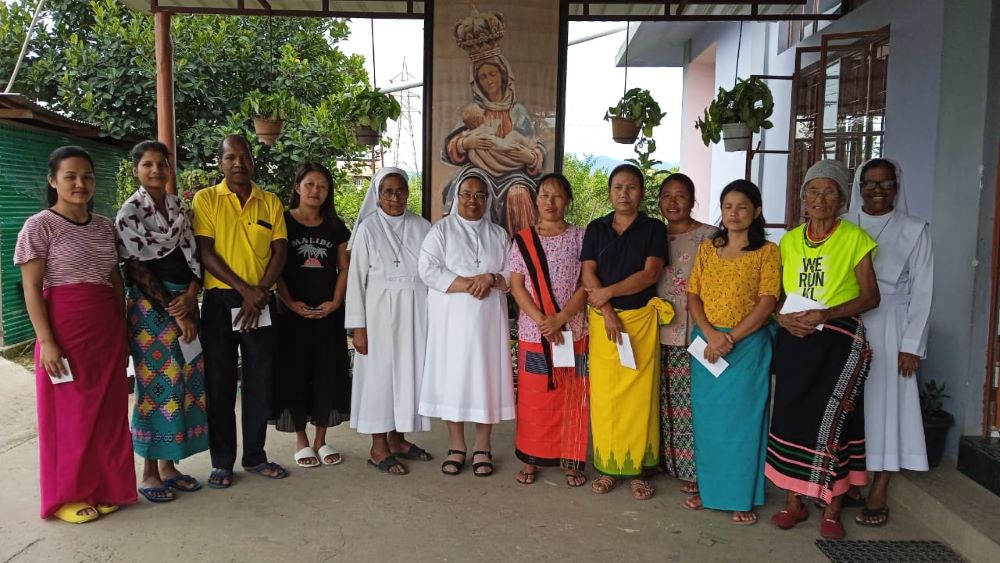
Salesian Provincial Sr. Alphonsa Kurisingal (center) poses with the staff and therapists of the Sneha Bhavan Integrated Rehabilitation Centre during a visit in 2022. At Kurisinga's left is Sr. Tresa Karottukunnel, founder of the center, at her right is Sr. Mercy Plapallil. (Courtesy of Roni Elizabeth)
The government is headed by the Hindu nationalist Bharatiya Janata Party (Indian People's Party), which came to power in the state in 2017, promising to deal with the drug problem. The party was reelected in 2022.
While poppy plants are grown mainly in Manipur's hill districts, the opium trade involves Meitei Hindus, Muslims, Nagas and Nepalis from the valley, officials say.
Shantirani, a psychiatric nurse by profession, said she does not know who makes drugs or who trades them, "but drugs are easily available, and I am struggling with it."
Shantirani said family problems and the easy availability of drugs had gotten her into drugs, mostly heroin, seven years ago. She is at the nuns' center for the third time, as she relapsed after two earlier treatments.
"This time, I want to recover fully and lead a happy life, never to touch drugs again," she told GSR.
The Salesian provincial, Sr. Alphonsa Kurisingal, said her congregation was the first to address the drug problem and HIV/AIDS, especially among women, in Manipur. Kurisingal is based in Guwahati, Assam, and her jurisdiction includes Manipur.
"There were many centers for men but none for women," she told GSR.
'My parents were victims of drugs, and they died early. … Whenever I treat women, I treat them like my mother.'
—Beena Kumari
The Imphal center has treated nearly 3,000 women with about a 50% recovery rate, Kurisingal said.
Kurisingal said the congregation initially worked with street women, but drug addiction has now spread throughout society. Many, like Shantirani, relapse, she said. "We need to continue this mission as it is a need of the hour," she said. "It is a challenge."
New Delhi-based federal Ministry of Social Justice and Empowerment recognizes and funds the Salesian center, among the country's first rehabilitation centers for females with addiction problems.
Elizabeth said that drug consumption, especially among women, leads to instability in families, poor upbringing of children and continuing poverty. She said most of their patients come from families where either the husband or the wife is an addict.
Female addicts often die young with no one to care for their children, the nun said, adding. "Very often, their husbands are also addicted and not able to contribute to the family."
One such orphan is Beena Kumari, a nurse who now works at the nuns' center. "My parents were victims of drugs, and they died early," she told GSR.
She thanks the Salesian nuns for bringing her up, educating her and providing her with a job. "Whenever I treat women, I treat them like my mother," she added.
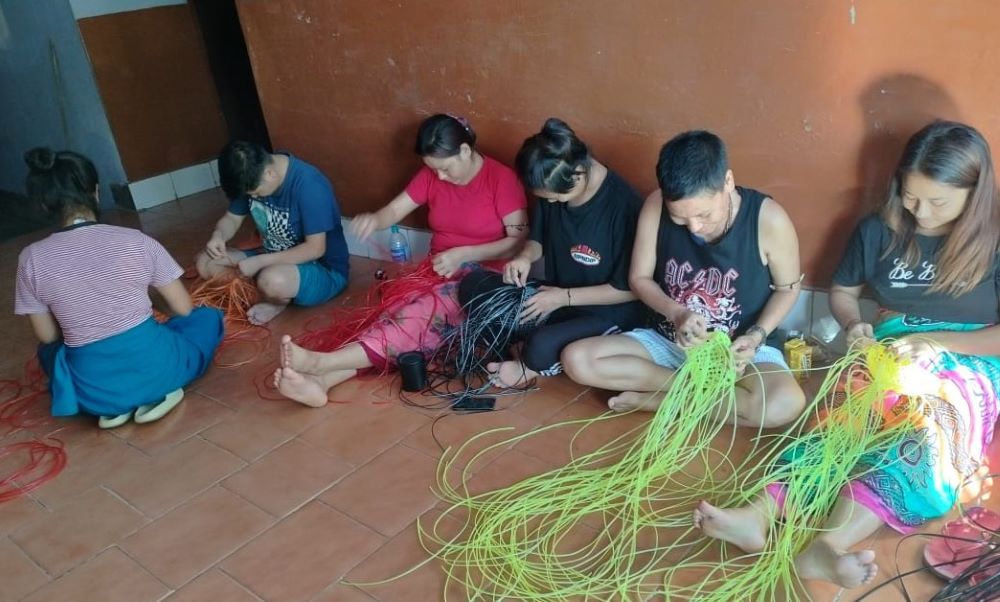
Recovering substance abuse patients undergo training in basket-making at Sneha Bhavan Integrated Rehabilitation Centre in Imphal, in Manipur state in northeastern India. (Courtesy of Roni Elizabeth)
Another patient told GSR that she was finding it hard to stay sober because of acute withdrawal symptoms. In the past, when she was discharged, her friends influenced her to take drugs again.
"This time, I want to stay sober, somehow," said the 19-year-old university student, who did not want to be identified. She also said her several friends use drugs and are involved in the violence.
"I am not interested in fighting. I have neither the courage nor the strength to do so. I just want to recover from this addiction," she said, tears running down her cheeks.
Khuraijam Brajeswari, a psychologist who works in a 60-bed government drug treatment center in Imphal, said the current crisis in Manipur has links with the drug problem, "which has entered all areas of life, particularly among youngsters."
She said northeastern Indian states are vulnerable to drugs because of their proximity to Myanmar, which is part of Southeast Asia's Golden Triangle — bordered by Thailand, Laos and Myanmar — and a hotbed of drug trafficking.
But not all drugs come from neighboring Myanmar, Brajeswari said.
"We produce a big chunk in Manipur too," she said.
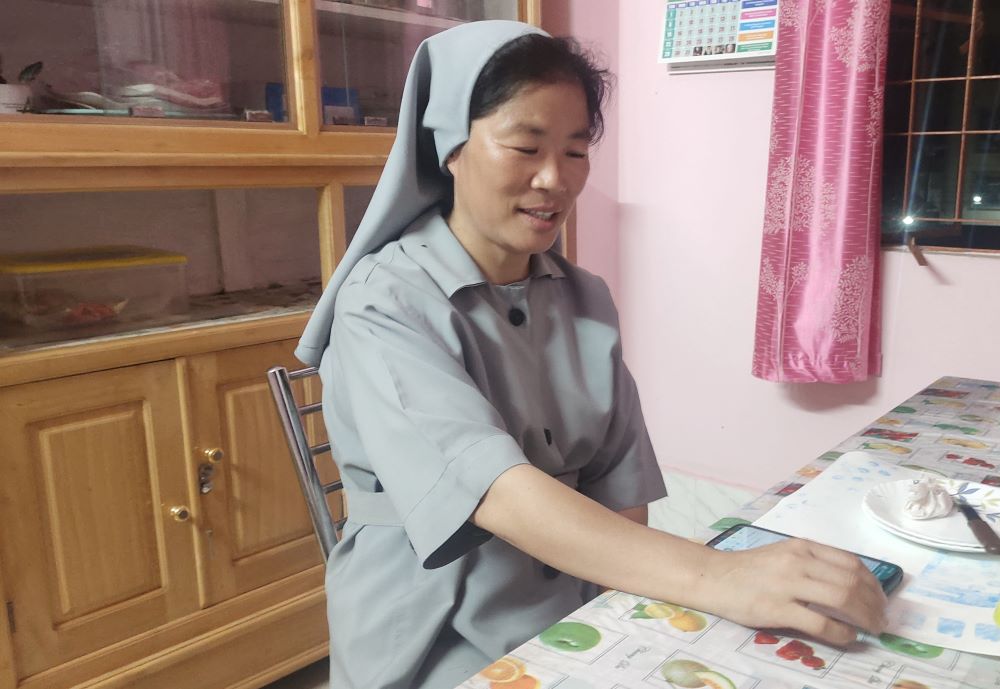
Salesian Sr. Tresa Karottukunnel founded the Sneha Bhavan Integrated Rehabilitation Centre for Addicts at Imphal, the capital of the northeastern Indian state of Manipur. (Thomas Scaria)
The police in May reported that they have cleared 15,496 acres of poppy fields since 2017. Of that, 84% of the land was Kuki-dominated and 15% in Naga areas.
According to the police report, 2,518 people have been arrested in drug-related cases since 2017. Of them, 1,083 were Meitei Pangals, a community that follows Islam. Kukis accounted for 873 arrests and Meiteis for 381.
Brajeswari sees easy availability, modernization and peer pressure as the main reasons for drug abuse among the Manipur people.
Salesian Sr. Tresa Karottukunnel, who started the center 30 years ago, is known as the pioneer of treating women with substance addiction in northeastern India. She said women play a crucial role in the socioeconomic areas of states with matriarchal traditions in the region.
"If a man is addicted, his wife takes care of him as well as the family, but if a woman is addicted, the family becomes totally dysfunctional," Karot told GSR.
Addiction, she said, "is a very complex disease which requires further specialized skills and knowledge."
The center follows a 12-step therapeutic model based on Alcoholics or Narcotics Anonymous, a worldwide fellowship of recovering people. It offers yoga and meditation, medical detoxification, individual and group therapies and psychological education.
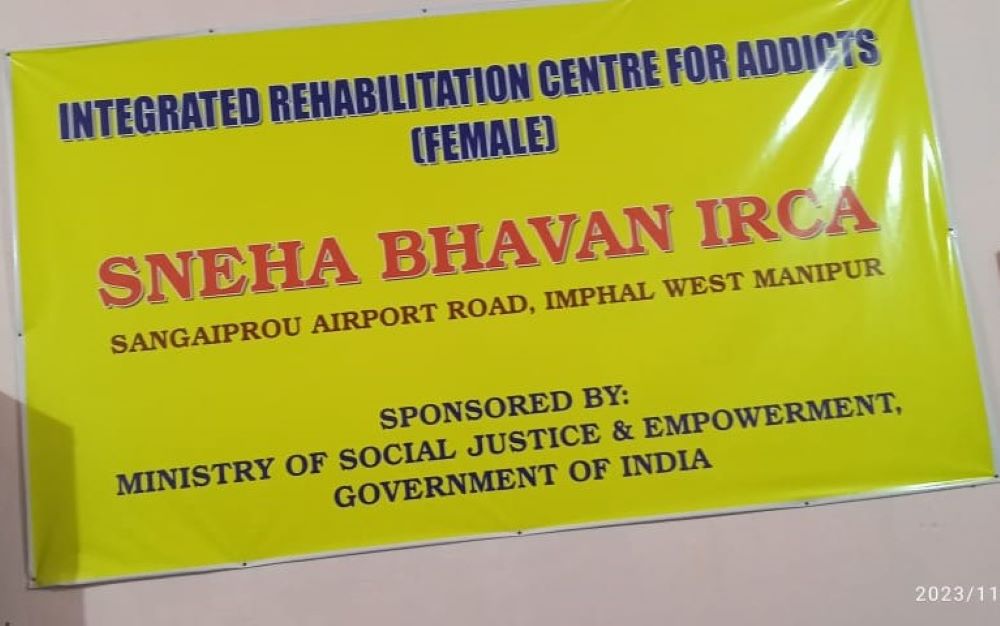
A banner displayed at the Sneha Bhavan Integrated Rehabilitation Centre in Imphal, Manipur, India, indicates its legal status and recognition by the Indian government. (Courtesy of Roni Elizabeth)
Patients stay at the center for one month, as stipulated by the government guidelines, "but the patients require at least 90 days for recovery," Karot said.
Awon (not her real name) is active in the recovery network of Manipur after her treatment in the nuns' center.
"I spent my time in recovery to give the message to other suffering drug users and help in their recovery," she said, adding that helping others recover "actually strengthens my recovery too."
Awon regrets that Manipur has only two centers for women, while the number of people with addictions is increasing across the country.
India's Department of Social Justice and Empowerment supports only four drug rehabilitation centers for women, including the two in Manipur, officials said in December. A survey published in 2019 found more than 5.4 million women ages 10 to 75 in India were dealing with substance abuse issues.
Advertisement
Innocent, who goes by a single name and is chief therapist at the Salesian center, said most of its 30 beds are always full.
Innocent, the center's only male therapist, said the center has faced several challenges because women with substance abuse disorders pose unique problems.
"Most of them are thrown out from their homes and are out in the streets, subjected to sexual exploitation, homelessness and isolation," he said. Many, he added, are at high risk of diseases such as HIV/AIDS due to sharing needles for injecting drugs.
Some other women's congregations have recently started working among drug users in northeastern India.
Sr. Merin Lukose of the Franciscan Hospitaller Sisters of the Immaculate Conception directs a center that treats both men and women drug users in Guwahati in the neighboring state of Assam. She is happy that the church is responding to a major problem in the region.
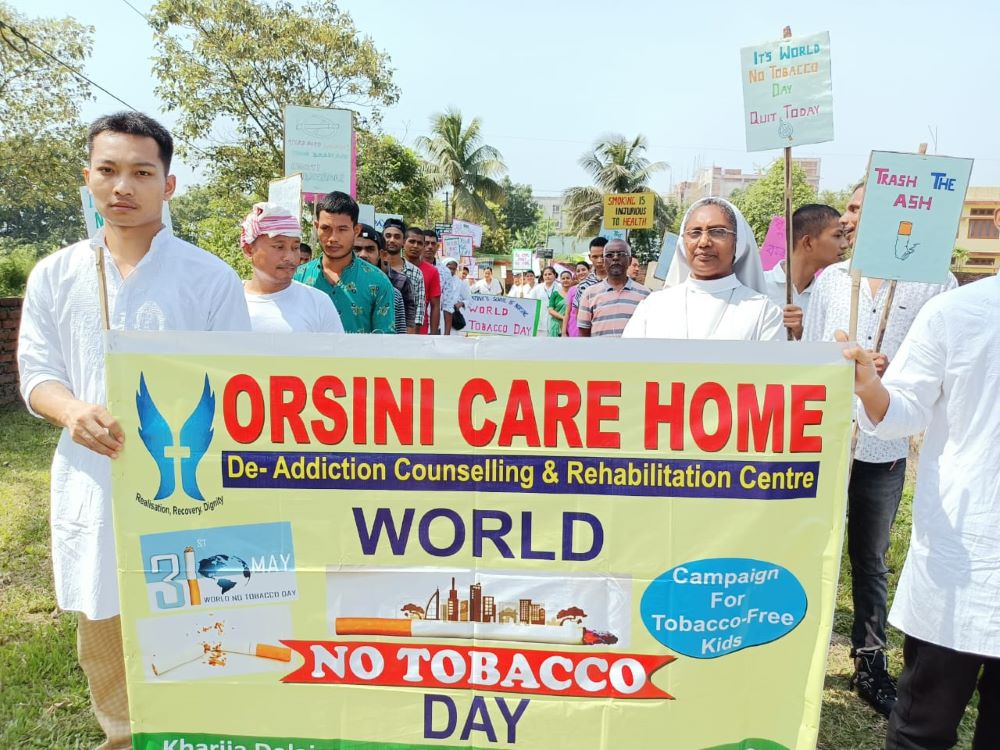
Franciscan Hospitaller Sr. Merin Lukose of Orsini Care Home, Guwahati, Assam, India, leads a campaign against tobacco use among students. (Courtesy of Merin Lukose)
The Orsini Care Home, started by the Hospitaller Sisters in 2010 at Guwahati, has 30 beds for men and eight for women.
Several church health care workers from the region now attend a six-month course on addiction management developed by the Colombo Plan, a 72-year-old intergovernmental organization that strives to develop human resources in the south and southeast regions of Asia.
"Recently, the Catholic Hospital Association of India announced this training course, and I am attending it," Lukose told GSR.
The Missionary Sisters of Mary Immaculate also work among drug users in northeastern India. Two of its members — Srs. Fulcyca Kurbah and Blinda Marwein — are also getting trained to start a treatment center for drug users in Meghalaya, another state in the region.
"Drug addiction is a major health and social issue in Meghalaya, and we cannot continue to ignore this," Kurbah told GSR.


